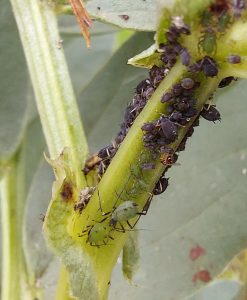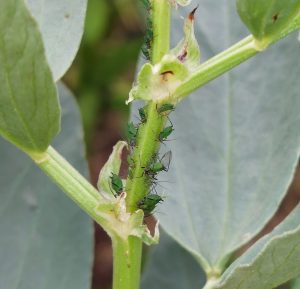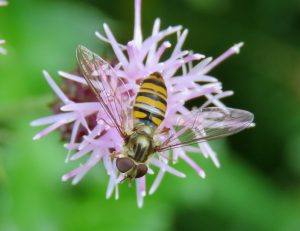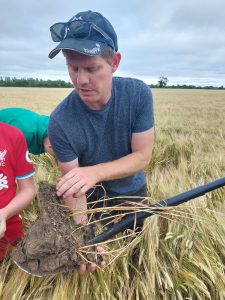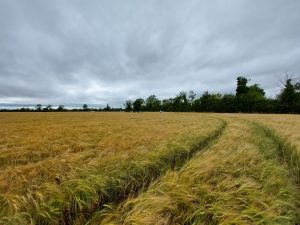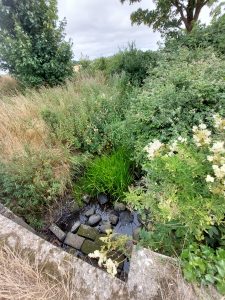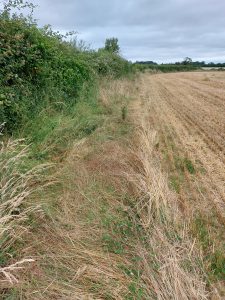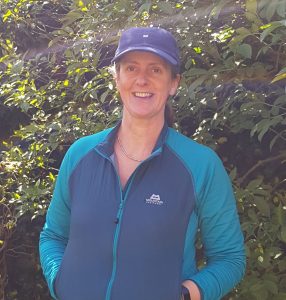There are around 180 different species of Hoverfly in Ireland. They are important pollinators of plants and crops, the second most important after wild bees.
Hoverflies may only live a few days to a few weeks, with many of them regarded as the ‘Farmers friend’ for an important reason, as some of their larvae have an appetite for aphids, which can cause millions of pounds worth of damage to crops each year.
Aphids on a crop of beans, Dunne Tillage Farm.
A female Hoverfly will adjust the number of eggs she lays dependent on how many aphids there are around for her larvae to feast on. She knows this by detecting distress pheromones given off by plants under aphid attack. Everyone’s a winner as the plant gets help with its aphid problem while the fly ensures her offspring are well fed.
Some Hoverfly numbers are boosted by migrants, like the migratory Marmalade hoverfly, with huge numbers crossing from mainland Europe in the summer months. The adult Hoverflies strategically use powerful tailwinds to travel hundreds of kilometers in a day and will migrate in spring from Mainland Europe to lay eggs in southern parts of Ireland. Each female can lay up to 400 eggs and, though many die as eggs or larvae, the departing population in autumn is larger than that arriving in spring.
Marmalade hoverfly Episyrphus balteatus, a true ‘Farmers Friend’. Photo credit: Steven Falk.
What’s the problem with using aphicides?
At present, we rely on insecticide to control pests. Insecticide resistance is an increasing problem for agriculture and forestry, over the past decade, pyrethroid resistant clones of the grain aphid have been frequently detected across Ireland. Pyrethroids are currently the primary insecticide used to control cereal aphids and BYDV (Barley Yellow Dwarf Virus).
For pollinators, the use of pesticides and in particular herbicides, can harm pollinators both directly and indirectly. Pollinators are also often exposed to more than one active substance at a time, and the interactions between different pesticides can cause more harm than exposure to individual chemicals – a phenomenon known as the ‘cocktail effect’.
Can a tillage farm go aphicide free?
Tillage farmers in Owenstown, Maynooth, Michael and Norman Dunne have a 400-acre farm, growing winter wheat, beans, spring barley, oats and spring wheat. They are now aphicide free, by moving to a regenerative agriculture system, which has resulted in increased soil fertility, biodiversity, water retention and cleanliness and soil carbon sequestration.
Norman Dunne at the Dunne Tillage farm.
5 years ago, they moved from an intensive tillage system to a more regenerative approach. They started with a 10% conversion and are now fully converted.
3 years ago, they stopped using aphicide, moved to non-inversion tillage, using cover crops and rotations. They save their own seed and inoculate the seed with biological feeds and root enhancing natural products. This approach along with encouraging natural pest control insects, i.e., Hoverflies, Parasitic wasps and Ladybirds has allowed this tillage farm to go insecticide free.
The farm has native hedgerows, trees and field margins, providing food (flowers), from spring to autumn and shelter. They have a small stream that runs through the farm, they value this wetland habitat and there is a wonderful wetland margin which has naturally filled with native plants such as, Greater willowherb, Meadowsweet and Bramble. This provides the farm with good habitat for the valuable insects, who do vital pest control work in the fields.
Wetland habitat, native hedgerows and field margins on the Dunne tillage farm.
This regenerative agriculture system, free from aphicides will benefit the ‘Farmers friend’, aka the Hoverfly (and all pollinating insects), allowing them to perform the vital service of crop pest control, as well as pollination.
If you’d like to find out more about Hoverflies check out our website here https://pollinators.ie/record-pollinators/hoverflies/recognising-hoverflies/
If you’d like to find out more about Norman Dunne’s farm, check out the Farming for Nature information and interview here https://www.farmingfornature.ie/nominees/norman-dunne/
By Ruth Wilson, Farmland Pollinator Officer, All-Ireland Pollinator Plan.

